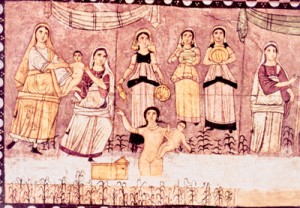Thoughts on Today’s Lessons for Aug. 24, 2014

Moses found by Pharaoh’s daughter. Fresco at the ancient synagogue of Dura Europos in Syria, circa 200 CE.
Joseph and his family came to Egypt to escape famine; but over the generations things changed. The Hebrew people increased in numbers, but now toil as Pharaoh’s slaves. Evil Pharaoh, fearing this growing community, decides to kill all the Hebrew baby boys, a threat that scripture will later echo in Herod’s decision to kill Bethlehem’s babies after the birth of Jesus. But the baby Moses escapes in a floating basket. He will go on to become the next great figure in the ancestral stories, who will lead the people out of Egypt on a long trek toward the Promised Land.
Psalm: Psalm 124
The Psalmist remembers the people’s deliverance from slavery in a hymn of thanksgiving to the God who carried them through the frightening exodus from Egypt. We remember their passage through the Red Sea and then, in striking imagery, the Psalm likens the people to a bird escaping from a snare. The hymn concludes with joyous thanksgiving: “Our help is in the name of the Lord.”
Second Reading: Romans 12:1-8
In his letter to the Romans, Paul returns to a beautiful metaphor that he uses often to describe the body of the church: Like our own bodies, the church has many parts. Each has a purpose, and all must function together to make the body work. True for the 1st century church in Rome, it’s just as true today: Some lead, some teach, some give, some learn, some listen; some offer compassion. All together we make up one body in Christ.
Gospel: Matthew 16:13-20
Versions of this key Gospel passage appear in the Gospels of Matthew, Mark and Luke. It is a major turning point in all the Gospels, an important moment in which Jesus first acknowledges that he is the Messiah, the son of the living God. Matthew then shows Jesus declaring Peter “the rock” upon which he will build the church. All three Gospels, in almost identical words, show us Jesus “sternly” commanding the disciples not to tell anyone that he is the Messiah. Theologians still debate the meaning of this “Messianic secret.” Why do you suppose Jesus would tell his disciples not to spread such good news?
